

Up Shit's Creek with a turd for a paddle. Reddit.com: over 18? Alux. Some Maya believe that the Aluxob are called into being when a farmer builds a little house on his property, most often in a maize field (milpa).
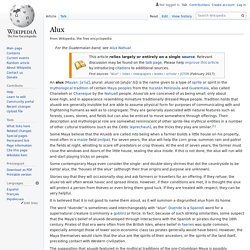
For seven years, the alux will help the corn grow, summon rain and patrol the fields at night, whistling to scare off predators or crop thieves. At the end of seven years, the farmer must close the windows and doors of the little house, sealing the alux inside. If this is not done, the alux will run wild and start playing tricks on people. Some contemporary Maya even consider the single- and double-story shrines that dot the countryside to be kahtal alux, the "houses of the alux" (although their true origins and purpose are unknown). Stories say that they will occasionally stop and ask farmers or travellers for an offering. Pleased as punch. Bangers and mash. Bangers and mash, also known as sausages and mash, is a traditional dish of Great Britain and Ireland comprising sausages served with mashed potatoes.
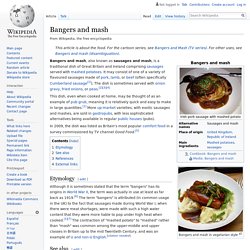
It may consist of one of a variety of flavoured sausages made of pork, lamb, or beef (often specifically Cumberland sausage[1]). The dish is sometimes served with onion gravy, fried onions, or peas.[2][3][4] Polari. Terminology[edit] Alternate spellings include Parlare, Parlary, Palare, Palarie, and Palari.
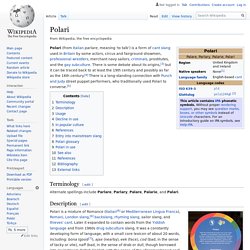
Description[edit] Polari is a mixture of Romance (Italian[6] or Mediterranean Lingua Franca), Romani, London slang,[6] backslang, rhyming slang, sailor slang, and thieves' cant. Later it expanded to contain words from the Yiddish language and from 1960s drug subculture slang. Usage[edit] Dondurma. Description[edit] Two qualities distinguish Turkish ice cream: texture and resistance to melting.
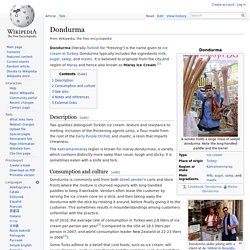
Aussie, Aussie, Aussie! Forgotten Curse Words. Konerak Sinthasomphone. Nova. Callate. Alternative ways of saying "shut up" Cats pajamas. Tellurian. Words! Bizarre, Obsolete, Odd, Outdated & Weird + Cartoon Fun! Updated: 4/11/2013 Brownielocks and The 3 Bears presentCartoon Fun and Check our listing below to understand the conversation in our cartoon!
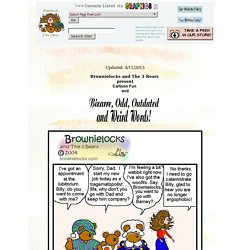
Every generation creates its own terms as a way of expressing themselves or the times they live in. CHALET. This article is about an emergency service protocol.
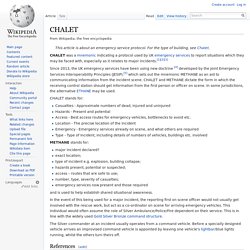
For the type of building, see Chalet. CHALET was a mnemonic indicating a protocol used by UK emergency services to report situations which they may be faced with, especially as it relates to major incidents.[1][2][3] Since 2013, the UK emergency services have been using new doctrine [4] developed by the Joint Emergency Services Interoperability Principles (JESIP),[5] which sets out the mnemonic METHANE as an aid to communicating information from the incident scene.
CHALET and METHANE dictate the form in which the receiving control station should get information from the first person or officer on scene. In some jurisdictions, the alternative ETHANE may be used. CHALET stands for: METHANE stands for: major incident declared? And is used to help establish shared situational awareness. Words! Bizarre, Obsolete, Odd, Outdated & Weird + Cartoon Fun! Words! Bizarre, Obsolete, Odd, Outdated & Weird + Cartoon Fun! Nocebo. Harmless substance that creates negative psychologically induced response in a patient A nocebo effect is said to occur when negative expectations of the patient regarding a treatment cause the treatment to have a more negative effect than it otherwise would have.
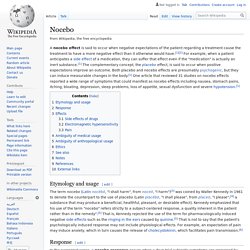
For example, when a patient anticipates a side effect of a medication, they can suffer that effect even if the "medication" is actually an inert substance. The complementary concept, the placebo effect, is said to occur when positive expectations improve an outcome. Both placebo and nocebo effects are presumably psychogenic, but they can induce measurable changes in the body.
Red herring. A red herring is something that misleads or distracts from a relevant or important question.[1] It may be either a logical fallacy or a literary device that leads readers or audiences toward a false conclusion.
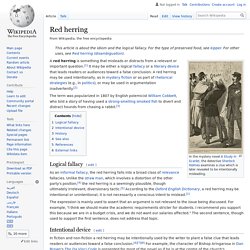
A red herring may be used intentionally, as in mystery fiction or as part of rhetorical strategies (e.g., in politics), or may be used in argumentation inadvertently. Hollow leg. Hair of the dog. An alcoholic beverage consumed as a hangover rememdy.
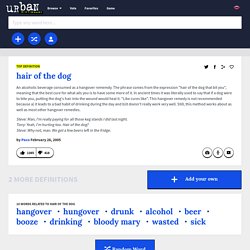
The phrase comes from the expression "hair of the dog that bit you", meaning that the best cure for what ails you is to have some more of it. In ancient times it was literally used to say that if a dog were to bite you, putting the dog's hair into the wound would heal it. "Like cures like". This hangover remedy is not recommended because a) it leads to a bad habit of drinking during the day and b)it doesn't really work very well. Parro. Pommy. The CaterHam Tales Part VI- The Butterfly, The Ham and The Wardrobe Thief. : fatpeoplestories. Togs. Arvo. The CaterHam Tales Part III- Greasing Her Palms. : fatpeoplestories. What's the difference between Ten Square Feet, and Ten Feet Squared? Chicken strips. The Pure Evil Insult Generator - Home. Hog's pudding. Generate a Random Name - Fake Name Generator. Tweak. What does vexed mean? vexed Definition. Meaning of vexed. OnlineSlangDictionary.com.
List of British words not widely used in the United States. Wikipedia glossary This is a list of British words not widely used in the United States.
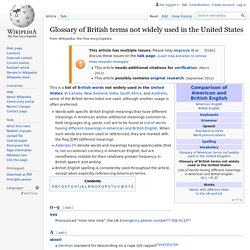
In Canada, New Zealand, India, South Africa, and Australia, some of the British terms listed are used, although another usage is often preferred. Words with specific British English meanings that have different meanings in American and/or additional meanings common to both languages (e.g. pants, cot) are to be found at List of words having different meanings in American and British English. When such words are herein used or referenced, they are marked with the flag [DM] (different meaning).Asterisks (*) denote words and meanings having appreciable (that is, not occasional) currency in American English, but are nonetheless notable for their relatively greater frequency in British speech and writing.British English spelling is consistently used throughout the article, except when explicitly referencing American terms. 0–9[edit] Pronounced "nine nine nine", the UK Emergency phone number[1] (US:911)[2] Bless your heart.
Collins English Thesaurus.